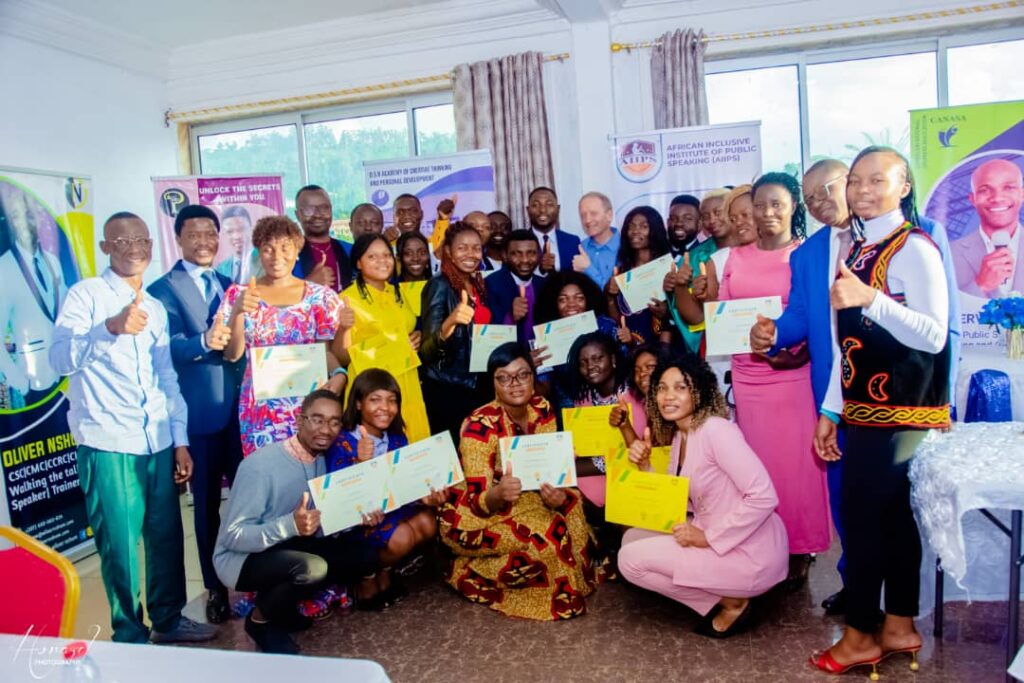Uncategorized
Home » Blog » Challenges Faced by Aspiring Professional Speakers in Africa and Ways to Mitigate or Overcome Them: A Case Study of Cameroon Early in the morning, I was in a phone called an aspiring speaker in Africa, particularly from Cameroon by name Ebai Blanche discussing challenges aspiring speakers are facing in continent and after the called, I was inspired to penned this article. Please, don’t read this article if you do not have an intention to create impact with your story through professional speaking. In the vibrant tapestry of Africa, Cameroon stands out not just for its cultural diversity and natural beauty but also for its budding pool of talented individuals striving to make their mark on the professional speaking circuit. Aspiring speakers in Cameroon and across the continent face a unique set of challenges. Recognizing and addressing these hurdles is crucial for fostering a dynamic and influential speaking community. Challenges 1. Limited Access to Professional Networks: Many aspiring speakers struggle to connect with established speakers or organizations that could offer guidance, mentorship, or speaking opportunities. 2. Financial Constraints: The cost of training, attending workshops, or investing in marketing materials can be prohibitive for many up-and-coming speakers. 3. Lack of Awareness and Value Perception: The professional speaking industry in some parts of Africa is still emerging, leading to a limited understanding of its importance in personal and professional development. 4. Insufficient Training Resources: Access to quality training programs or resources tailored to the African context is often limited, hindering skill development. 5. Language Barriers: With Cameroon being a bilingual country (French and English), language can pose a unique challenge when speakers want to reach broader, international audiences. Strategies to Mitigate or Overcome Challenges 1. Building Strong Networks: Aspiring speakers should actively seek out and join professional organizations, social media groups, or local toastmaster clubs that align with their interests. Networking opens doors to mentorship, collaboration, and speaking engagements.One of such Networks that aspiring Cameroonian Speakers can benefit and leverage from are the Camerooon National Speakers Association (CANASA) with headquarters in Bamenda and the International Virtuall Speakers Association (VSAI) with the head quarters in the Netherlands. 2. Creative Financial Strategies: Consider leveraging online platforms for crowdfunding or seeking out sponsorships from local businesses interested in brand enhancement through speaking events. 3. Raising Awareness: Organize community events, workshops, and seminars to demonstrate the value of professional speaking. Collaborating with educational institutions can also help in embedding the importance of these skills in the youth. 4. Leveraging Online Learning: Utilize online courses and platforms that offer affordable (or even free) training options. Websites like Coursera, LinkedIn Learning, and local platforms may provide tailored content to enhance speaking skills. 5. Embrace Bilingualism: Use bilingualism as an asset rather than a barrier. Offering talks, workshops, or content in both French and English can widen audience reach and demonstrate versatility. “Never let life’s trials actually kill you; instead, allow them to strengthen you and allow you to realize your true potential. Don’t back down from a difficulty; instead, use it as a springboard to the next level.” ~Oliver Nshom While the path to becoming a professional speaker in Cameroon comes with its fair share of challenges, these obstacles are not insurmountable. By leveraging local resources, embracing digital tools, and fostering a supportive community, aspiring speakers can carve out their niche and contribute meaningfully to the narrative of Africa on the global stage. With determination and strategic planning, the voice of Cameroon and Africa at large can resonate within and beyond the continent’s borders. Drop in the comment session the problems Professional Speakers are facing in your country and possible mitigation strategies.



